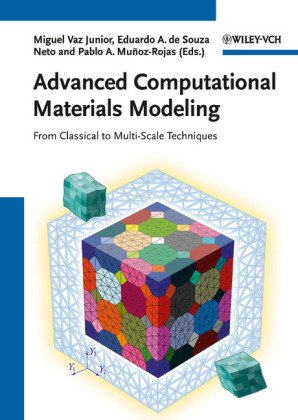

Most ebook files are in PDF format, so you can easily read them using various software such as Foxit Reader or directly on the Google Chrome browser.
Some ebook files are released by publishers in other formats such as .awz, .mobi, .epub, .fb2, etc. You may need to install specific software to read these formats on mobile/PC, such as Calibre.
Please read the tutorial at this link: https://ebookbell.com/faq
We offer FREE conversion to the popular formats you request; however, this may take some time. Therefore, right after payment, please email us, and we will try to provide the service as quickly as possible.
For some exceptional file formats or broken links (if any), please refrain from opening any disputes. Instead, email us first, and we will try to assist within a maximum of 6 hours.
EbookBell Team

4.0
86 reviews
ISBN 10: 3527324798
ISBN 13: 978-3527324798
Author: Miguel Vaz Junior, Eduardo A. de Souza Neto, Pablo A. Munoz-Rojas
With its discussion of strategies for modeling complex materials using new numerical techniques, mainly those based on the finite element method, this monograph covers a range of topics including computational plasticity, multi-scale formulations, optimization and parameter identification, damage mechanics and nonlinear finite elements.
Materials Modeling – Challenges and Perspectives
Local and Nonlocal Modeling of Ductile Damage
Recent Advances in the Prediction of the Thermal Properties of Metallic Hollow Sphere Structures
Computational Homogenization for Localization and Damage
A Mixed Optimization Approach for Parameter Identification Applied to the Gurson Damage Model
Semisolid Metallic Alloys Constitutive Modeling for the Simulation of Thixoforming Processes
Modeling of Powder Forming Processes; Application of a Three-invariant Cap Plasticity and an Enriched Arbitrary Lagrangian–Eulerian FE Method
Functionally Graded Piezoelectric Material Systems – A Multiphysics Perspective
Variational Foundations of Large Strain Multiscale Solid Constitutive Models: Kinematical Formulation
A Homogenization-Based Prediction Method of Macroscopic Yield Strength of Polycrystalline Metals Subjected to Cold-Working
advanced computational methods in mechanical and materials engineering
advanced computational modelling of composite materials
what is computational materials science
advanced computational methods
Tags: Miguel Vaz Junior, Eduardo de Souza Neto, Pablo Munoz Rojas, Advanced